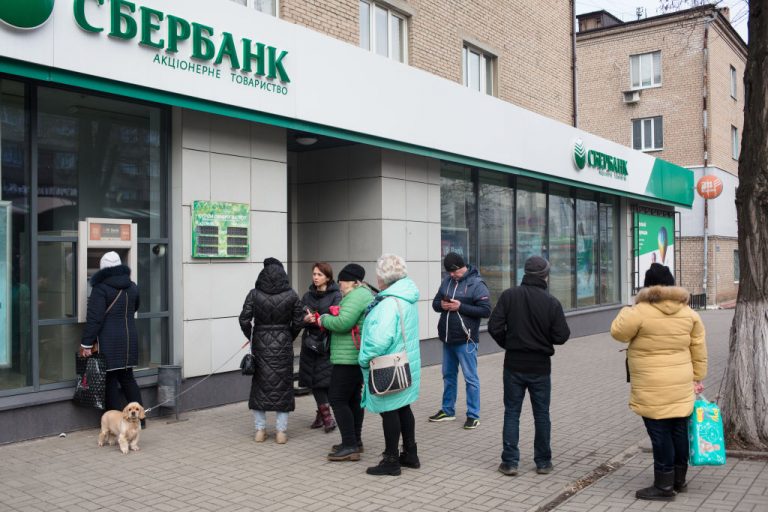In a world increasingly defined by geopolitical tensions and economic sanctions, the relationship between China and Russia stands as a testament to the many complexities of international finance and diplomacy.
Recent developments have highlighted a cautious shift in approach by Chinese banks towards their dealings with Russia — underscoring the far-reaching impact of global sanctions and what this means in terms of diplomatic relations.
Russian officials have acknowledged the challenge while asserting their commitment to “resolving issues” that have arisen from some Chinese institutions’ suspension of transactions with Russia. The move — triggered by the fear of sanctions following Russia’s war in Ukraine — has prompted intense discussion between the two nations.
RELATED: Xi and Putin to Hold Virtual Meeting, Bolstering Sino-Russian Relationship
Andrey Rudenko, Russia’s deputy foreign minister, emphasized the ongoing efforts to address payment processing concerns as he expressed confidence in overcoming the hurdles posed by sanctions fears. “Problems regarding payments between China and Russia ‘will be solved,'” said Rudenko, adding that the two countries remain in “close dialogue.”
An economic lifeline?
Success
You are now signed up for our newsletter
Success
Check your email to complete sign up
Despite these challenges, trade between China and Russia continues to thrive, with a notable shift towards using the Chinese yuan for transactions. The adaptation reflects a strategic pivot by Russia in response to being expelled from the SWIFT financial messaging system in 2022, and highlights the yuan’s surprising role as an economic lifeline for Moscow.
“China has the economic interests and strategic interests not to completely cut ties with Russia, and then I think also importantly that China seems to argue that what is important now is to de-escalate — to seek more peaceful negotiations instead of further isolate and provoke Russia,” Liang Yan, a professor and chair of economics at Willamette University, told Voice of America (VOA).
But the suspension of business by major Chinese banks with Russia has not only highlighted the immediate financial implications, but also broader strategic considerations. The involvement of smaller Chinese financial institutions — willing to finance Russia and assist in service payments — highlights a more nuanced approach to maintaining economic relations amid global pressures.
RELATED: China’s International Balance of Payments Records First Deficit Since 2019
Toeing the line
Yet, this delicate balance is increasingly being tested. Further U.S. sanctions introduced last month have put additional pressure on foreign banks — threatening them with secondary sanctions and isolation from Western investors should they engage with sanctioned Russian entities. This has led to a reassessment of Russian business by at least two state-owned Chinese banks.
RELATED: The Collapse of Evergrande: A Symbol of China’s Deepening Property Crisis, Flailing Economy
“China decides its own position and policy based on the merits of the matter itself,” said Liu Pengyu, spokesperson for the Chinese Embassy in Washington. As for Russia and Ukraine, “we will continue to play a constructive role in seeking and achieving peace,” he added.
Still, Beijing’s stance has been one of careful navigation when it comes to its neighbor to the north, and perhaps, most important ally. While not condemning Russia’s actions in Ukraine, China has also expressed its intention to not flout international sanctions deliberately. This position reflects a broader strategy by Beijing to engage in global commerce while adhering to the principles of sovereignty and non-interference.
“I do think longer term, we’re likely to see a continued growing trade relationship and investment relationship between China and Russia,” said Dexter Roberts, author of The Myth of Chinese Capitalism. “For Russia, it really matters.”
Economic boost or bust
The economic interdependence between China and Russia is underscored by the significant trade volume between the two countries, which reached $240.1 billion in 2023 — marking a 26.3 percent increase from the previous year.
This relationship — driven by Russia’s supply of energy, oil, and agricultural commodities — is a cornerstone of the two nations’ strategic partnership, notes Liang Kuo-yuan, president of the Yuanta-Polaris Research Institute economics think tank based in Taiwan.
“It’s hard to say whether China will buy a bit more oil — the possibility is there — but it can’t offset the amount that it used to sell into Western Europe and the rest of the world,” said Liang.
But analysts are underscoring the broader implications of this dynamic, especially as China struggles with an economic slowdown of its own — most notably in the real estate and banking sectors.
“China’s imports have weakened, slumping 7.6 percent in the first seven months of 2023 — potentially signaling weak domestic demand,” said Nicholas R. Lardy from the Peterson Institute for International Economics (PIIE).















